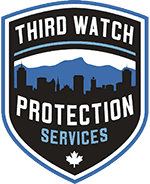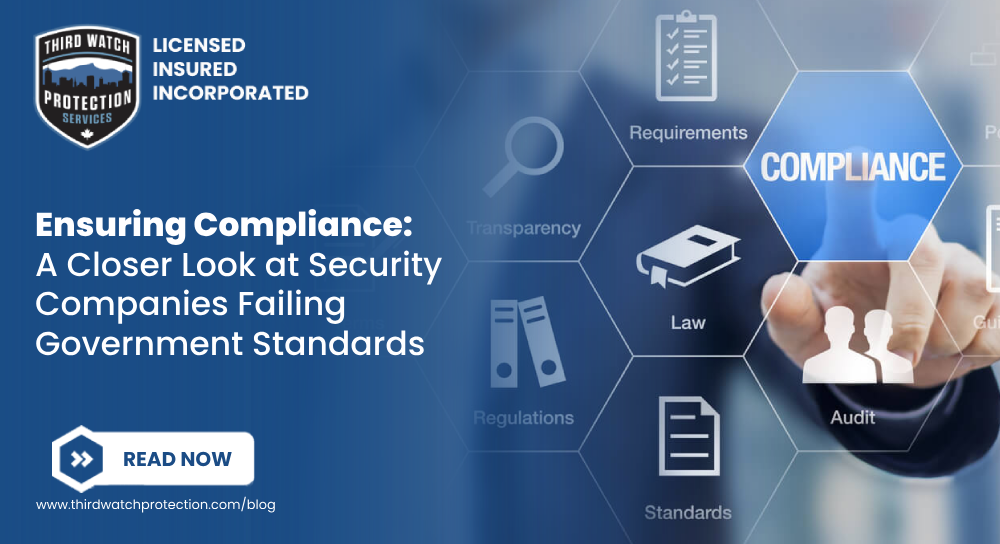Ensuring Compliance: A Closer Look at Security Companies Failing Government Standards
In the ever-evolving landscape of security services in Ontario, ensuring compliance with governmental regulations has become paramount. As the province continues to grapple with increasing security threats, the role of licensed security companies becomes even more critical. Unfortunately, as this blog post will detail, an alarming number of these security providers are failing to meet the standards mandated by government agencies, leading to serious implications for public safety and consumer trust.
The Importance of Compliance
Compliance with government standards is not just a bureaucratic obligation; it’s a moral and legal responsibility. Security companies are entrusted with safeguarding individuals, properties, and even communities from potential threats. This responsibility extends beyond the mere presence of security personnel; it encompasses a wide range of protocols, including hiring practices, ongoing training, and technology use.
In Ontario, the Security License Act and the Private Security and Investigative Services Act set clear guidelines about what constitutes proper conduct and operational standards. These regulations are designed to protect not only the integrity of the security industry but also the citizens it serves. When companies fail to comply, they put everyone at risk.
A Disturbing Trend
Recent reports suggest a growing number of security companies in Ontario are neglecting compliance requirements. A high-profile investigation revealed that several firms operating in urban areas had not only overlooked mandatory licensing but had also failed to implement necessary training programs. Such lapses are particularly concerning in an industry where the stakes are so high.
For instance, the investigation identified instances of unlicensed security personnel providing services at major events, leaving attendees vulnerable to potential threats. These breaches not only undermine public safety but also lead to liability issues for event organizers and venue owners who assumed that their security providers were reputable and compliant.
The Consequences of Non-Compliance
The ramifications of failing to comply with government standards can be severe. For one, unlicensed security companies risk substantial fines and sanctions, which can ultimately destabilize their operations. However, the impact reaches further, affecting public trust and overall safety.
When security providers cut corners, they compromise the effectiveness of their services. Poorly trained personnel may not respond appropriately in emergency situations, which can exacerbate incidents rather than mitigate them. Additionally, clients who rely on security services to protect their businesses or events may find themselves in difficult positions; unlicensed providers can result in losses due to theft, vandalism, or even injury.
Furthermore, public safety concerns create a ripple effect. If community members feel unsafe because they are aware of non-compliant security firms operating in their vicinity, it can lead to increased fear and anxiety. This perception can affect everything from property values to local business operations.
The Role of Government Oversight
Government oversight is essential for maintaining compliance in the security industry. In Ontario, organizations such as the Ministry of Community Safety and Correctional Services are tasked with monitoring security companies and ensuring adherence to laws and regulations.
However, challenges remain. Limited resources can hinder thorough inspections and the enforcement of compliance standards. While seasoned professionals do their best to cover the extensive territory and growing number of firms, the sheer volume of security providers makes it difficult to monitor comprehensively.
Additionally, some security companies may attempt to evade scrutiny by operating under the radar or employing unlicensed personnel. This creates a culture of distrust that can hinder the legitimate security providers who adhere to compliance standards and aim to deliver high-quality services to their clients.
Best Practices for Security Companies
To combat the trend of non-compliance, it’s imperative that security companies adopt best practices to uphold governmental standards and improve their reputation. Here are several actionable strategies:
1. Conduct Regular Training and Audits
Ongoing training should be a cornerstone of any security firm’s operations. Regular audits help ensure that all personnel are up-to-date with the latest regulations and best practices. Investing in training sessions that cover emergency response, ethics, and proper use of technology can enhance the effectiveness of security personnel.
2. Ensure Proper Licensing
Every security officer employed should be duly licensed according to provincial regulations. Companies should establish procedures to verify licenses and conduct background checks to prevent hiring unqualified personnel. Maintaining proper documentation will protect the company from legal repercussions.
3. Transparency and Accountability
Adopting transparent operational practices can enhance a firm’s credibility. Companies should encourage customer feedback, publish compliance reports, and work closely with regulatory organizations to demonstrate their commitment to meeting standards. Establishing an accountability framework will provide internal motivation to maintain compliance.
4. Engage with Regulatory Agencies
Security companies should actively engage with regulatory agencies to stay informed about changes in laws and compliance expectations. Participating in workshops, seminars, and consultation forums can help firms better understand their obligations and advocate for reforms that improve the industry overall.
Community Involvement
The security industry must recognize its role not only as a provider of safety but as a member of the community. Building relationships with local citizens, businesses, and law enforcement agencies can help foster a culture of safety and security.
Community outreach programs, where security personnel participate in local events or safety training workshops, can help improve relationships and build trust. As community members see security companies investing in their neighborhoods, they’re more likely to report concerns and work collaboratively towards shared goals.
In Conclusion
The landscape of security services in Ontario is at a critical juncture. With a growing number of firms failing to meet government standards, the need for compliance, accountability, and community engagement has never been more urgent. By adopting best practices, fostering relationships, and prioritizing transparency, security companies can not only enhance their operational efficiency but also contribute positively to the overall safety and wellbeing of the communities they serve.
Moving forward, it’s imperative for both government regulators and security firms to work together to ensure compliance and uphold the highest standards of public safety. As the saying goes, “an ounce of prevention is worth a pound of cure”—in the context of security, this truth cannot be overstated. By prioritizing compliance, we can collectively create a safer Ontario for everyone.
If you’re considering switching security providers, we’re here to assist you in creating a seamless transition process that guarantees your building’s security at all times. Reach out to us today at 1-888-444-5232 or email us at mail@thirdwatchprotection.com. Let us help safeguard your business and condominium! Your peace of mind is our priority, and we’re ready to ensure a smooth changeover.



